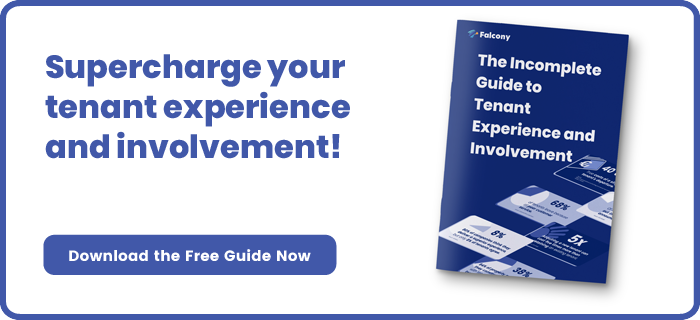What is Tenant Sentiment Analysis?
In today’s competitive property management landscape, understanding tenant sentiment has become a crucial element for landlords and property managers.
Tenant sentiment analysis refers to the systematic assessment of tenants’ opinions, feelings, and attitudes towards their living conditions, property management practices, and overall experiences. By employing advanced data analytics techniques, property managers can gain invaluable insights that inform decision-making, enhance tenant satisfaction, and ultimately drive retention rates.
The Importance of Tenant Sentiment Analysis
Tenant sentiment analysis is pivotal for several reasons, offering a comprehensive view that extends beyond mere satisfaction scores:
Enhancing Tenant Satisfaction
Understanding tenant sentiments allows property managers to identify areas where improvements can be made. By analysing feedback, whether positive or negative, property managers can make informed changes to services and amenities that directly impact tenant satisfaction. For instance, if tenants consistently express dissatisfaction with the cleanliness of common areas, property managers can implement more rigorous cleaning schedules or consider hiring additional staff. This proactive approach can lead to a more harmonious living environment and foster a sense of community among tenants, ultimately contributing to higher retention rates.
Improving Property Management Practices
Regularly assessing tenant sentiment provides property managers with a clear view of how their practices are perceived. If tenants express concerns about maintenance response times or communication channels, property managers can adjust their strategies to address these issues. For example, if tenants report delays in maintenance requests, property managers can streamline their processes by adopting management software that tracks requests and ensures timely follow-up. This not only helps in rectifying current problems but also aids in preventing future complaints, thus enhancing the overall efficiency of property management operations.
Driving Tenant Retention
A positive tenant experience is essential for retaining occupants. Tenant sentiment analysis enables property managers to identify and address issues before they escalate, thereby reducing tenant turnover. By fostering a supportive and responsive management environment, landlords can cultivate loyalty among tenants, reducing the costs associated with vacancy and re-letting. Furthermore, satisfied tenants are more likely to recommend the property to friends and family, creating a ripple effect that attracts new tenants and enhances the property’s reputation.
Benefits of Tenant Sentiment Analysis
Implementing tenant sentiment analysis offers numerous advantages for property management, shaping a more responsive and tenant-focused approach:
Data-Driven Decision Making
With insights derived from tenant feedback, property managers can make informed decisions based on actual data rather than assumptions. This leads to more effective strategies for enhancing tenant satisfaction and optimising property management processes. For example, if data reveals that tenants value specific amenities, property managers can focus their budgets on maintaining and improving these features rather than investing in less valued options.
Proactive Problem Resolution
By identifying negative sentiments early, property managers can address issues before they escalate into larger problems. This proactive approach not only improves tenant satisfaction but also reduces the likelihood of tenant turnover. For instance, if a common concern involves noise levels, property managers can introduce soundproofing measures or address tenant disputes promptly, creating a more pleasant living environment for all.
Enhanced Community Involvement
Understanding tenant sentiment can help foster a sense of community within properties. By addressing tenant concerns and facilitating positive interactions, property managers can create an environment where tenants feel valued and engaged. Organising community events, based on tenant preferences gathered through sentiment analysis, can further enhance social bonds and create a supportive atmosphere that encourages tenant retention.
Reputation Management
Positive tenant experiences lead to favourable reviews and word-of-mouth referrals, which are vital for attracting new tenants. By actively monitoring and responding to tenant sentiments, property managers can build a strong reputation in the market. Proactive reputation management, including addressing negative feedback publicly and implementing changes based on constructive criticism, demonstrates a commitment to tenant welfare and enhances the property’s appeal to prospective tenants.
Methods of Conducting Tenant Sentiment Analysis
Surveys and Questionnaires
One of the most straightforward methods for gathering tenant sentiment is through surveys and questionnaires. These tools can be distributed periodically to capture tenants’ opinions on various aspects of their living experience, such as amenities, maintenance, and overall satisfaction. Designing surveys that include a mix of quantitative ratings and qualitative open-ended questions allows for comprehensive feedback. Online platforms often facilitate the collection and analysis of this data, making it accessible for immediate review, which can lead to quicker implementation of improvements.
Social Media Monitoring
In the digital age, tenants frequently voice their opinions on social media platforms. Monitoring these channels can provide property managers with real-time insights into tenant sentiments. This includes understanding trends, identifying potential issues, and gauging the overall mood of the tenant community. Tools designed for social media monitoring can analyse sentiment in real time, allowing property managers to respond promptly to negative feedback and engage with tenants in a meaningful way.
Online Reviews and Ratings
Platforms such as Google Reviews, Trustpilot, and property-specific websites provide a wealth of information regarding tenant sentiments. By analysing reviews, property managers can identify common themes in feedback and make necessary adjustments to their practices. Systematically tracking this feedback over time can reveal patterns that indicate broader trends, helping property managers to make strategic decisions that enhance tenant satisfaction.
Data Analytics Tools
Employing sophisticated data analytics tools allows property managers to analyse vast amounts of data efficiently. Machine learning algorithms can identify patterns and trends in tenant sentiment, offering predictive insights that inform strategic decision-making. These tools can assist in segmenting tenant feedback by demographics or property types, providing nuanced insights that help tailor management strategies to specific tenant groups.
Implementation of Tenant Sentiment Analysis
To successfully implement tenant sentiment analysis, property managers can follow a systematic approach:
Define Objectives
Clearly outline the goals of conducting tenant sentiment analysis. Whether it is to improve tenant satisfaction, enhance property management practices, or increase retention rates, having specific objectives will guide the analysis process. This clarity will help in focusing efforts on the most critical aspects of tenant experience and will streamline the implementation process.
Select Appropriate Tools
Choose the right tools and platforms for collecting and analysing tenant feedback. This may include survey software, social media monitoring tools, and data analytics platforms that can handle large volumes of data. Researching and selecting tools that integrate well with existing property management systems can improve efficiency and ease of use.
Collect Data
Begin the data collection process by distributing surveys, monitoring social media, and analysing online reviews. Ensure that the collection methods are accessible and encourage maximum tenant participation. Engaging tenants through incentives for survey completion or during community events can significantly boost response rates.
Analyse Feedback
Once the data is collected, employ analytical tools to assess tenant sentiments. Look for patterns, trends, and areas that require attention. Focus on both quantitative metrics, such as average satisfaction ratings, and qualitative feedback to gain a comprehensive understanding of tenant experiences. This multi-faceted analysis will provide a clearer picture of tenant sentiment.
Implement Changes
Based on the insights gained, implement changes that address tenant concerns and enhance their living experience. Communicate these changes to tenants to demonstrate that their feedback is valued and acted upon. Highlighting specific improvements made as a result of tenant feedback can reinforce a positive perception of management and encourage ongoing participation in future sentiment analyses.
Monitor and Adjust
Regularly monitor tenant sentiment over time to gauge the effectiveness of implemented changes. Continuously adjust strategies based on ongoing feedback to ensure that tenant satisfaction remains a priority. Establishing a routine for revisiting tenant sentiment analysis can help maintain a proactive stance toward tenant involvement and satisfaction.
Challenges in Tenant Sentiment Analysis
While the benefits of tenant sentiment analysis are clear, several challenges can arise:
Data Volume and Quality
Collecting data from various sources can lead to an overwhelming amount of information. Ensuring the quality and relevance of this data is crucial for drawing accurate conclusions. Property managers must implement robust data management systems to sift through the noise and extract meaningful insights. Establishing criteria for what constitutes valuable feedback can help filter out irrelevant data.
Interpretation of Sentiment
Interpreting sentiment accurately can be complex. Tenants may express sentiments in nuanced ways that require careful analysis to understand the underlying feelings. Employing sentiment analysis tools that can differentiate between positive, negative, and neutral sentiments is essential for obtaining reliable results. Training staff to interpret data effectively can further enhance the analysis process.
Privacy Concerns
As with any data collection effort, privacy concerns must be addressed. Property managers must ensure that tenant feedback is collected in a manner that respects privacy and complies with relevant data protection regulations. Transparent communication about how data will be used can foster trust and encourage participation in sentiment analysis efforts. Implementing anonymised feedback options can further reassure tenants about their privacy.
Conclusion
Tenant sentiment analysis is an invaluable tool for property managers seeking to enhance tenant satisfaction, improve management practices, and drive retention rates. By systematically assessing and responding to tenant sentiments, landlords can create a more positive living environment that benefits both tenants and property owners alike. This analytical approach not only helps in resolving current issues but also provides a framework for anticipating and mitigating future concerns.
As the property management landscape continues to evolve, embracing innovative data analysis techniques will be essential for staying ahead of tenant expectations and fostering long-term success. By prioritising tenant sentiment, property managers can cultivate an environment of trust, satisfaction, and involvement that ultimately leads to thriving operations.
If your organisation is looking for a 360° tenant experience tool to involve all employees, service providers and tenants to improve the quality of your operations, have a look at the 30-day free trial of Falcony | Tenant Portal:
We are building the world's first operational involvement platform. Our mission is to make the process of finding, sharing, fixing and learning from issues and observations as easy as thinking about them and as rewarding as being remembered for them.
By doing this, we are making work more meaningful for all parties involved.
More information at falcony.io.

Related posts
Different Types of Tenant Satisfaction Surveys
Tenant satisfaction surveys are essential tools for property managers and landlords seeking to...
Why You Need to Start Measuring Tenant Satisfaction?
In the property management industry, tenant satisfaction is a key indicator of a successful and...
What is Experience Management in Commercial Real Estate?
In the rapidly evolving commercial real estate (CRE) sector, the concept of Experience Management...






